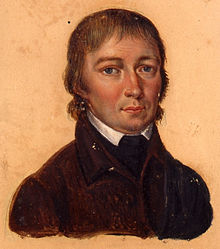The cookbook in question came from an unlikely author, though he wasn’t alone in his path from the Enlightenment movement into early nationalism:
Valentin Vodnik was born in 1758 near Ljubljana, today the capital of Slovenia and then part of the Habsburg empire. He was a man of boundless energy, curiosity, and drive: Besides his work as a priest and later a high-school teacher and headmaster, he was fluent in half a dozen languages, wrote some of the first Slovene poetry, published the first Slovene newspaper, and began corresponding with intellectuals in Slovene.Vodnik set out to publish a cookbook in the Slovene language using as few words with German roots as possible. Creating what he titled The Cookbook (Kuharske bukve) was a challenge, for three reasons:
Vodnik’s mission was popularizing and elevating the reputation of the language at a time when educated Slovenes mostly spoke German, considering their native tongue to be the vernacular of poor illiterate farmers, unfit for polite society and incapable of expressing complex ideas.
- “Vodnik had probably never cooked a meal in his life.”
- His sources were all German cookbooks and chefs, not Slovene kitchens.
- The recipes reflected the upper-class cuisine of Vienna rather than the plain fare of most Slovene speakers.
Even though the largely illiterate, poor Slovenes living in rural areas had little use for Vodnik’s decadent recipes, the book was popular with presbytery cooks working for village priests. These cooks were an important source of new cooking techniques and ideas for small village communities and, with their help, some of Vodnik’s simpler recipes and cooking methods found a wider audience.By then there was enough published in Slovene to codify a language out of several dialects and make it distinct from the related tongues of neighboring regions. It wasn’t until 1991, however, that Slovenia became an independent country to go with Slovene.
In 1868, Vodnik’s recipes served as an important touchstone for Magdalena Pleiweis, who wrote The Slovene Cookbook. This new cooking guide, finally written by a woman who knew her way around the kitchen, included updated versions of Vodnik’s recipes and complemented them with the types of traditional Slovene dishes that he had pointedly ignored, such as buckwheat žganci—once traditional “poor man’s food”—and potica pastry, which comes in more than 100 regional variations.

No comments:
Post a Comment